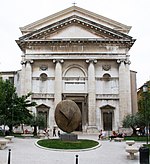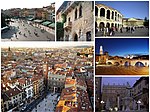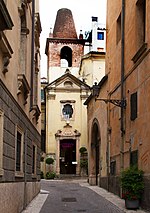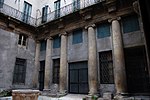Congress of Verona
1822 conferences1822 in Europe1822 in international relations19th-century diplomatic conferencesAlexander I of Russia ... and 9 more
Arthur Wellesley, 1st Duke of WellingtonDiplomacy during the Greek War of IndependenceDiplomatic conferences in ItalyFrançois-René de ChateaubriandHistory of VeronaKlemens von MetternichNational questionsOctober 1822 eventsPost-Napoleonic congresses

The Congress of Verona met at Verona on 20 October 1822 as part of the series of international conferences or congresses that opened with the Congress of Vienna in 1814–15, which had instituted the Concert of Europe at the close of the Napoleonic Wars.
Excerpt from the Wikipedia article Congress of Verona (License: CC BY-SA 3.0, Authors, Images).Congress of Verona
Piazza Bra, Verona San Zeno
Geographical coordinates (GPS) Address Nearby Places Show on map
Geographical coordinates (GPS)
| Latitude | Longitude |
|---|---|
| N 45.439166666667 ° | E 10.994166666667 ° |
Address
Arena di Verona
Piazza Bra 1a
37121 Verona, San Zeno
Veneto, Italy
Open on Google Maps










